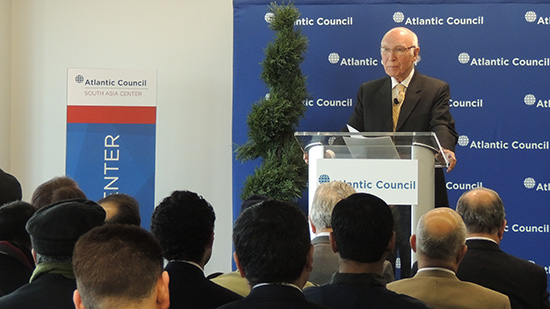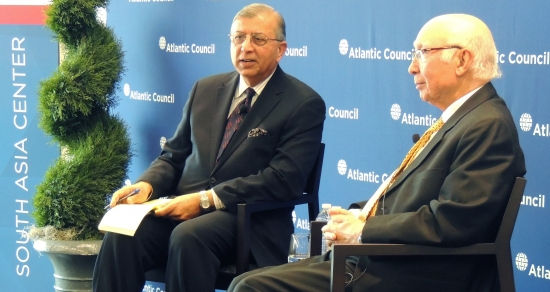 The year 2014 will mark a critical test for Pakistan and its new civilian leadership. Upcoming elections in two neighboring countries, a slated withdrawal of international troops from Afghanistan, and growing regional security and economic demands place Sartaj Aziz, leading national security and foreign affairs adviser to Prime Minister Nawaz Sharif, at the helm of the path forward.
The year 2014 will mark a critical test for Pakistan and its new civilian leadership. Upcoming elections in two neighboring countries, a slated withdrawal of international troops from Afghanistan, and growing regional security and economic demands place Sartaj Aziz, leading national security and foreign affairs adviser to Prime Minister Nawaz Sharif, at the helm of the path forward.
Pakistan witnessed a dismal 3% growth rate last year, preventing any relief to the country’s budget deficits or high unemployment levels. At a discussion hosted by the South Asia Center, Minister Aziz stressed that Pakistan’s newly elected civilian government sees economic development as a key priority during its term. In resolving the country’s economic woes, Aziz highlighted two central hurdles facing the administration: Pakistan’s internal security and external relationships.
“Economic development is not possible without a stable security situation,” Aziz stated. To this effect, the leadership has formulated a comprehensive security plan, which will be released soon. Without providing much detail, Aziz disclosed that the plan includes a specialized and properly trained counter terrorism force. The plan also aims to prevent failures in coordination between government entities and regions each tackling evolving security threats. A consultative process involving all stakeholders, launched last year, will continue to engage members of the Pakistan Taliban. Aziz stated, “The elimination of the Taliban from Pakistan is simply not possible. They are citizens. You may convert them though force [to a point], but you must convert their hearts and minds.”

“Economic development is not possible without better relations in the neighborhood,” he continued. Pakistan has taken steps to improve business and trade relations with India. Though not a “breakthrough” in relations, movements by both countries’ prime ministers signals an era of new engagement. Moreover, Pakistan has vested interests in a peaceful Afghanistan. Citing security and humanitarian concerns that will continue impacting the region, he urged the international community to remain invested in Afghanistan beyond 2014. Pakistan also seeks engagement with Central Asia, considering their abundance of energy and the growing energy demand in South Asia. “The opening of an energy corridor in South and Central Asia will provide many possibilities of prosperity and development.”
Aziz is in Washington for the US-Pakistan strategic dialogue, which has resumed this week after a three year hiatus. He stated “the challenge to the US-Pakistan relationship is to convert the transactional relationship to a strategic relationship.” While expressing optimism in improved relations, he called for more trust and sensitivity to Pakistan’s internal challenges, which are often exacerbated by regional issues. The US ought to be understanding of these challenges, he implied, as international engagement in the region has led to a “graveyard of empires” beginning with “the British, then Russians, and now Americans.”
